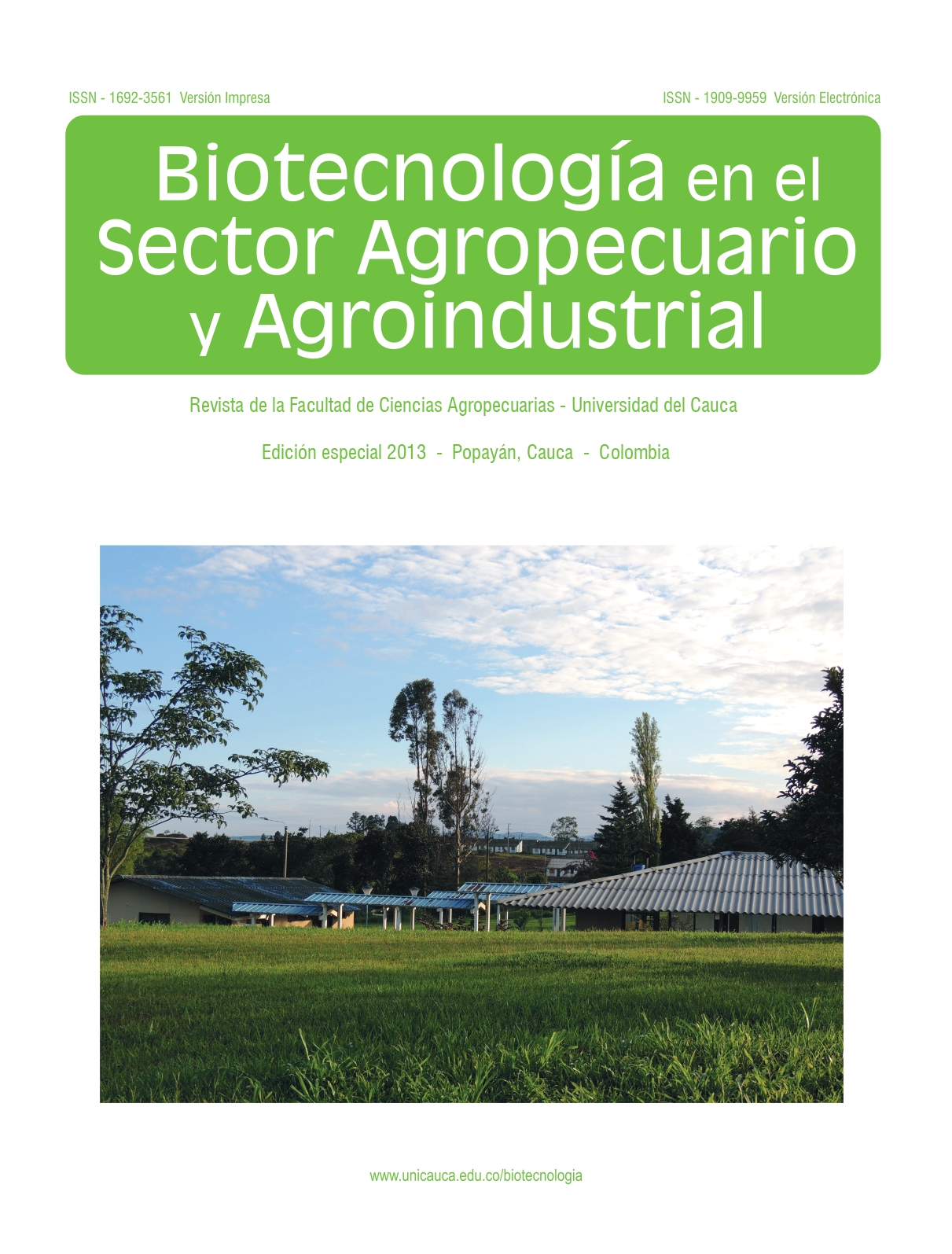Caracterización de almidones de yuca nativos y modificados para la elaboración de empaques biodegradables
Resumen
Se estudiaron las propiedades fisicoquímicas de tres variedades de almidón de yuca (Manihot sculenta Crantz) nativas y modificadas por hidroxipropilación.Las variedades estudiadas estaban nombradas con los códigos CM 7138-7, CUMBRE 3 y SM 707-17.Se determinó el grado de modificación de los almidones, se desarrollaron curvas de empastamiento de almidones, se obtuvieron propiedades térmicas mediante calorimetría de barrido diferencial (DSC) y termogravimetría (TGA) y se generaron espectros de absorción de los almidones por espectroscopía infrarroja con transformada de Fourier (FT-IR). Respecto a los almidones nativos, se identificaron diferencias entre éstos en las curvas de empastamiento, en la temperatura de transición vítrea (Tg) y en la temperatura de fusión (Tm);en cuanto a los almidones modificados, se identificaron diferencias entre éstos en el grado de sustitución molar, en las curvas de empastamiento, en la Tg, la Tm y en los espectros obtenidos mediante FT-IR; en ambos casos estas diferencias fueron atribuidas al contenido de amilosa y amilopectina de los almidones. Respecto a las diferencias entre almidones nativos y modificados, el proceso de hidroxipropilación generó cambios en las propiedades estudiadas. Debido a su contenido de amilosa, menor viscosidad y Tg de su almidón modificado, la variedad CM 7138-7fue aquella que posiblemente presentó mejor potencial para ser empleada en la elaboración de empaques biodegradables.Descargas
Lenguajes:
es;enReferencias bibliográficas
VELASCO, R., ENR˝QUEZ, M., TORRES, A., PALACIOS, L. y RUALES, J. Caracterizacin morfolgica de pelculas biodegradables a partir de almidn modificado de yuca, agente antimicrobiano y plastificante. Revista de biotecnologa en el sector agropecuario y agroindustrial, 10 (2), 2012, p. 152-159.
ENR˝QUEZ, M., VELASCO, R. y ORTIZ, V. Composicin y procesamiento de pelculas biodegradables basadas en almidn. Revista de biotecnologa en el sector agropecuario y agroindustrial, 10 (1), 2012, p. 182-192.
BEMILLER, J. and WHISTLER, R. Starch: chemistry and technology. 3 ed. Amsterdam (Netherlands): Academic Press, 2009, 900 p.
ARISTIZABAL, J. y S`NCHEZ, T. Gua tØcnica para la produccin y anÆlisis de almidn de yuca. Boletn de servicios agrcolas de la FAO. Roma (Italia): FAO, 2007, 153 p.
KAUR, L. SINGH, N. and SINGH, J. Factors influencing the properties of hydroxypropylated potato starches. Carbohydrate Polymers, 55, 2004, p. 211223.
JONES, L. and RIDDICK, J. Colorimetric determination of Propionaldehyde. Analytic Chemistry, 26 (6), 1954, p. 1035-1038.
PAL, J., SINGHAL, P. and KULKARNI, P. R. A comparative account of conditions of synthesis of hydroxypropyl derivative from corn and amaranth starch. Carbohydrates Polymers, 43, 2000, p. 155-162.
TESTER, R. and KARKALAS, J. Starch composition, fine structure and architecture. Journal of Cereal Science, 39, 2004, p. 151165.
THITIPRAPHUNKUL, K., UTTAPAP, D., PIYACHOMKWAN, K. and TAKEDA, Y. A comparative study of edible canna (Canna edulis) starch from different cultivars. Part I: Chemical composition and physicochemical properties, Carbohydrate Polymers, 53 (3), 2003, p. 317324.
VILLADA, H. Efecto de las variables de operacin de un extrusor de huso sencillo en la produccin de almidn termoplÆstico a partir de almidones agrios de yuca [Ph. D. Tesis Ingeniera de Alimentos]. Cali (Colombia): Universidad del Valle, Escuela de Ingeniera de Alimentos, 2005.
COLOMBIA. MINISTERIO DE AGRICULTURA Y DESARROLLO RURAL. Produccin y caracterizacin de pelculas flexibles biodegradables por extrusin de tornillo simple a partir de almidn de yuca, plastificante y PLA. Proyecto de investigacin, Informe final. BogotÆ, (Colombia): 2011.
MORITA, N. and VAN HUNG, P. Physicochemical properties of hydroxypropylated and cross-linked starches from A-type and B-type wheat starch granules. Carbohydrate Polymers, 59, 2005, p. 239-246.
LAWAL, O. Hydroxypropylation of pigeon pea (Cajanus cajan) starch: Preparation, functional characterizations and enzymatic digestibility. LWT Food Science & Technology. 44, 2011, p. 771-778.
CORKE, H. and GUNARATNE, A. Effect of hydroxypropylation and alkaline treatment in hydroxypropylation on some structural and physicochemical properties of heat-moisture treated wheat, potato and maize starches. Carbohydrate Polymers, 68, 2007, p. 305-313.
KIM, M. Evaluation of degradability of hydroxypropylated potato starch-polyethylene blend films. Carbohydrate Polymers, 54, 2003, p. 173-181.
PERERA, C., HOOVER, R. and MARTIN, A.M. The effect of hydroxypropylation on the structure and physicochemical properties of native defatted and heat-moisture treated potato starches. Food Research International, 30, 235-247. 1997.
UTTAPAP, D., CHUENKAMOL, B. PUTTANLEK, C. and RUNGSARDTHONG, V. Characterization of low-substituted hydroxypropylated canna starch. Food Hydrocolloids, 21, 2007, p. 1123-1132.
PERDOMO, J., COVA, A., SANDOVAL, A.J., GARC˝A, L., LAREDO, E. and MLLER, A.J. Glass transition temperature and water sorption isotherms of cassava starch. Carbohydrate Polymers, 76, 2009, p. 305310.
RICHARDSON, S., NILSSON, G., BERGQUIST, K., GORTON, L. and MISCHNICK, P. Characterization of the substituent in hydroxypropylated potato amylopectin starch. Carbohydrate research, 328, 2000, p. 365-373.
LEE, H.L. and YOO, B. Effect of hydroxypropylation on physical and rheological properties of sweet potato starch. Food science and thechnology, 44, 2011, p. 765-770.
TRAN, T., PIYACHOMKWAN, K. and SRIROTH, K. Gelatinization and Thermal Properties of Modified Cassava Starches. Starch Strke, 59, 2007, p. 4655.
PAREDES, O., AGAMA, E., OTTENHOF, M., FARHAT, I., ORT˝Z, J. y BELLO, L. Efecto de la nixtamalizacin sobre las caractersticas moleculares del almidn de variedades pigmentadas de maz. Interciencia, 29 (11), 2004, p. 643-649.
KAUR, L., SINGH, N. and SINGH, J. Factors influencing the properties of hydroxypropylated potato starches. Carbohydrate Polymers, 55 (22), 2004, p. 211-223.
RUIZ, G. Obtencin y caracterizacin de un polmero biodegradable a partir de almidn de yuca. Ingeniera y Ciencia, 2 (4). 2006, p. 5-28.
ATHAWALE, V. and VIDYAGAURI, L. Thermal studies on granular maize starch and its graft copolymers with vinyl monomers. Starch Strke, 52 (6), 2000, p. 205-213.
FORREST, B. and COVE, L. Identification and quantification or hydroxylpropylation of starch by FTIR. Die Staerke, 44 (5), 1992, p. 179-183.
RINDLAV, A., STADING, M., HERMANSSON, A. and GATENHOLM, P. Structure, mechanical and barrier properties of amylose and amylopectin films. Carbohydrate Polymers, 36, 1997, p. 217224.
LOPEZ, O., ZARITZKY, N. and GARCIA, M. Physicochemical characterization of chemically modified corn starches related to rheological behavior, retrogradation and film forming capacity. Journal of Food Engineering, 100, 2010, p. 160-168.
FLORES, E., GARC˝A, F., FLORES, E., NEZ, M., GONZ`LEZ, R. y BELLO, L. Rendimiento del proceso de extraccin de almidn a partir de frutos de plÆtano (musa paradisiaca). Acta Cientfica Venezolana, 55 (1), 2004, p. 86-90.


 Español
Español Inglés
Inglés





















.png)



